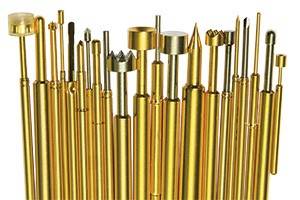Electrical / Electronic Probes
Substantial Yield Improvements with ECT’s LFRE Probes for PCBA Testing

ECT probes with proprietary lead-free plating passed extensive qualification at a major US based OEM
Fontana, California, May 2018: Everett Charles Technologies’ (ECT’s) LFRE plated probes successfully passed extensive qualification testing verses an incumbent probe at a major US based OEM for power infrastructure equipment. ECT’s LFRE proprietary plated spring probes demonstrated a significant improvement in first pass yield and fully met the customer’s expectations in contact reliability and probe life.
This customer’s fist pass yield (FPY) was negatively impacted by continuity fails due to poor contact. ECT engaged this OEM to optimize probe tip and forces for the board topography, enabling improved FPY. To extend the life of the contacts and address the difficult flux residue on the boards, ECT introduced LFRE plated probes to ensure the improved yield is benefited from for extended cycles. The total solution has achieved the yield goal, and demonstrated a stability that was not achieved with a number of other market solutions.
ECT’s proprietary LFRE plating has a hardness range of 550 to 650 Knoop which is about 3 to 4 times harder than gold electroplating, the industry standard for lead-free plated spring probes. This hardness makes the probe tips more durable and less susceptible to solder and material transfer.
ECT offers a broad line of lead-free probes for PCBA test applications. Lead-free plating is featured on ECT’s PogoPlus® LFRE series and LFLT long travel probes. In addition to improved tip ware, LFRE plated probes are less prone to solder transfer. Lead-free solder, and OSP (Organic Solderability Preservatives) treated copper pads typically present a harder or more abrasive contact surface causing excessive plating and probe tip wear. LFRE plating allows longer life and increased meantime between maintenance (MTBM).
Tony DeRosa, Senior Product Manager explains: “The customer request was for a more reliable contact and longer probe life for printed circuit boards using lead free solder. The incumbent probe was not able to provide reliable contact. This resulted in continuity failures and frustrated test personnel. We are proud to receive the very positive customer feedback, which states that ECT’s LFRE plating provides a much more reliable contact and significantly reduces board seating and continuity challenges that existed with the previous solution.”
To learn more about ECT’s LFRE plated test probes please visit: https://ect-cpg.com/ICT-FCT-probes
About Everett Charles Technologies (ECT):
ECT (headquartered in Fontana, CA) is the world's leading manufacturer of POGO ® contact probes for a wide range of applications including industrial, medical, military, connectors and testing bare and loaded printed circuit boards. R&D programs address engineering and materials issues that will affect Contact Solutions for the next decade. Methods for maintaining electrical continuity in miniature probes, improved spring technologies, and probe head geometries are under continual review. ECT POGO ® contacts are marketed worldwide through sales offices in the United States, Europe and Asia. ECT is a company of Xcerra™ Corporation, which provides capital equipment, interface products, and services to the semiconductor, industrial, and electronics manufacturing industries. Xcerra Corporation offers a comprehensive portfolio of solutions and technologies, and a global network of strategically deployed applications and support resources. Additional information can be found at www.ect-cpg.com and www.Xcerra.com.
trade press interested in technology, products
please contact
Barbara Loferer
Xcerra Corporation
825 University Avenue
Norwood, MA 02062-2643
Phone : +49 8031 406 216
E-mail: barbara.loferer@Xcerra.com
financial media interested in corporate news
please contact
Rich Yerganian
Xcerra Corporation
825 University Avenue
Norwood, MA 02062-2643
Phone : +1.781-467.5063
E-mail: rich.yerganian@Xcerra.com




